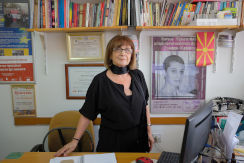Ask an activist: What is your message to the new generation of women and men activists?
Date:
About the author

Savka Todorovska from Skopje, Republic of North Macedonia, was a participant at the Fourth World Conference on Women held in Beijing in 1995. At the time, she was acting President of the National Council for Gender Equality, a national network of more than 100 independent organizations and women's groups that foster discussions on women's needs and issues. Currently the president of the same Council and with almost 28 years of non-governmental experience, she shares with UN Women what it takes to be a women`s rights activist and offers ideas for the new generation of activists.
“As activists, we should be a constant presence in the field and act as guardians of legal rights to enhance the implementation of women`s rights. We should express issues that are important to women, and help women identify their needs in their communities.
We should consider the issues and challenges of women of all ages – young, middle-aged and older adults. While older women’s experiences can be examples to other generations, they can be obstacles if they hinder young and middle-aged women. We must work with all three generations and hear their views. At the same time, through continuous education, we should help empower women to be advocates and a driving force for change in their communities. Training and education, especially for media and young people, are important field activities to foster change.
Gender equality needs to be addressed on many fronts.We are often told that we talk constantly about violence against women: We should continue to talk repeatedly about violence against women, it hasn’t gone away. We must educate the younger generation and break down the harmful gender stereotypes that result in violent behaviour, humiliation, sexism, and peer and cyber violence.
I see progress when I see empowered women. Women are not ashamed to talk about their problems. That is a major improvement for everyone. Still, although women talk about violence or their difficult financial positions, they do not always have the strength or the support needed to advance. This is why women’s organizations should provide the wind in the sails of and the public voice for women so they can be heard and seen making decisions to achieve their goals.”

This story is part of the regional media campaign “12 voices. 12 journeys. 12 women from 12 Europe and Central Asia countries”. Passionate about gender equality and women`s rights, explore aspects of the 12 critical areas of the Beijing Platform for Action: poverty; education and training; health; violence; armed conflict; economy; power and decision-making; institutional mechanisms; human rights; media; environment; and the girl child. On the eve of 2020 and the 25th anniversary of the 1995 Beijing Declaration and Platform for Action, these 12 women are reimagining economies, societies and political systems to achieve gender equality. Imagine a world where gender equality is the norm. These women do.